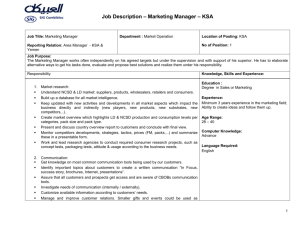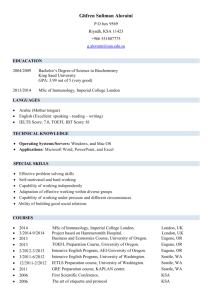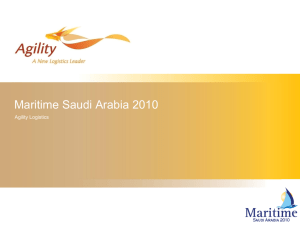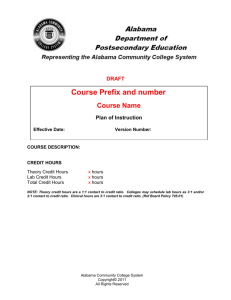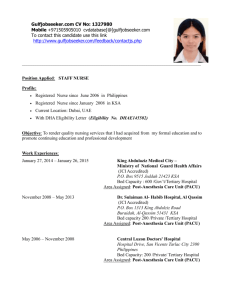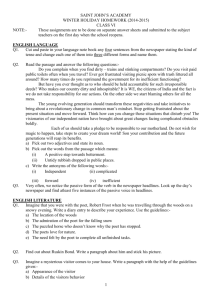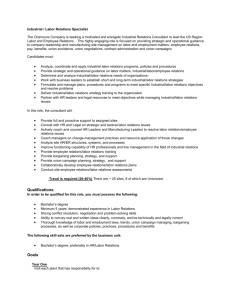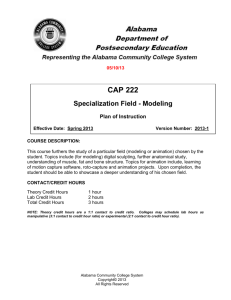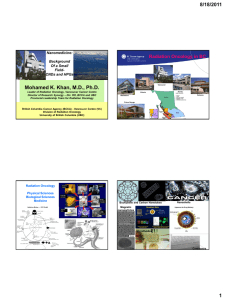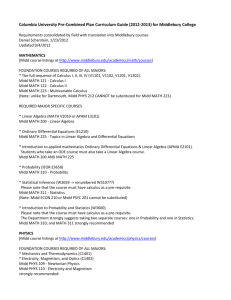CC Minutes Meeting 4 10.26.15
advertisement
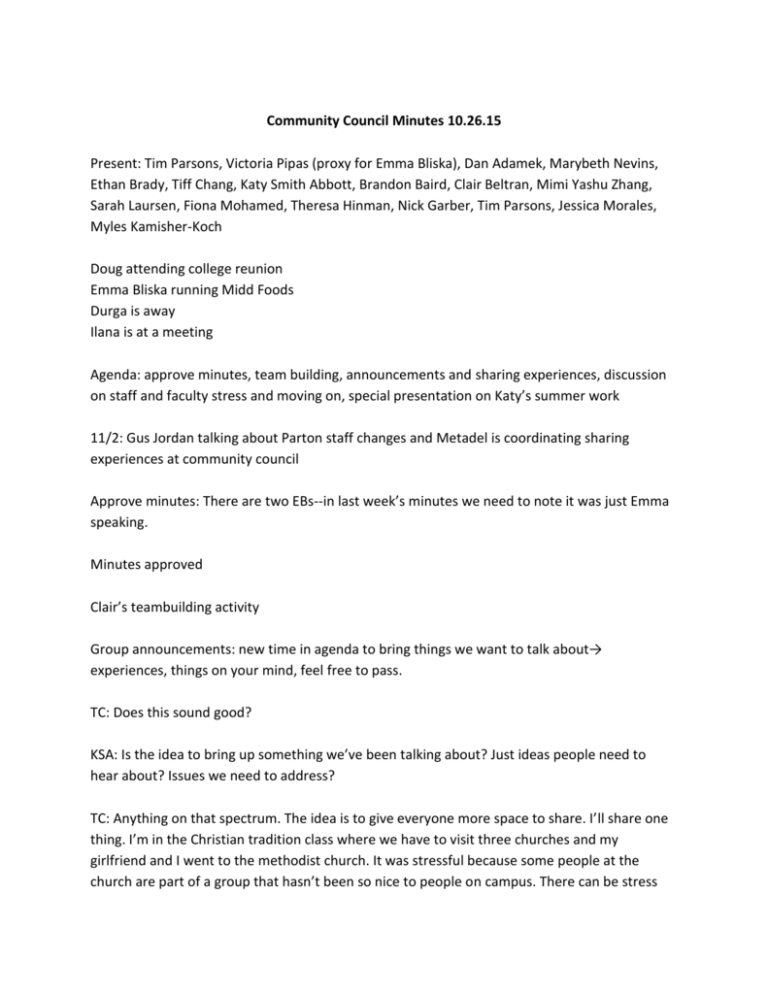
Community Council Minutes 10.26.15 Present: Tim Parsons, Victoria Pipas (proxy for Emma Bliska), Dan Adamek, Marybeth Nevins, Ethan Brady, Tiff Chang, Katy Smith Abbott, Brandon Baird, Clair Beltran, Mimi Yashu Zhang, Sarah Laursen, Fiona Mohamed, Theresa Hinman, Nick Garber, Tim Parsons, Jessica Morales, Myles Kamisher-Koch Doug attending college reunion Emma Bliska running Midd Foods Durga is away Ilana is at a meeting Agenda: approve minutes, team building, announcements and sharing experiences, discussion on staff and faculty stress and moving on, special presentation on Katy’s summer work 11/2: Gus Jordan talking about Parton staff changes and Metadel is coordinating sharing experiences at community council Approve minutes: There are two EBs--in last week’s minutes we need to note it was just Emma speaking. Minutes approved Clair’s teambuilding activity Group announcements: new time in agenda to bring things we want to talk about→ experiences, things on your mind, feel free to pass. TC: Does this sound good? KSA: Is the idea to bring up something we’ve been talking about? Just ideas people need to hear about? Issues we need to address? TC: Anything on that spectrum. The idea is to give everyone more space to share. I’ll share one thing. I’m in the Christian tradition class where we have to visit three churches and my girlfriend and I went to the methodist church. It was stressful because some people at the church are part of a group that hasn’t been so nice to people on campus. There can be stress tied to non-academic things. The sermon was about rest and work and I took away that overwork can be a type of violence. As a potential GSFS major, people talk about violence all the time but this is a new idea for me I was thinking about and wanted to share. BB: I’m teaching a first year seminar and after last week’s conversation I had a student tell me they were stressed. I was able to bring up points we talked about. I was able to tell the student it’s okay to get a B in the class and we talked about life for 45 minutes. It was a really nice experience SL: After last week’s conversation, I was thinking about ways to be more flexible in terms of assignments--not as rigidly structured. I gave an experimental assignment and results were terrific. They did a creative project and two students wrote songs. Thanks for the encouragement to try something new. CB: I went with the architecture department to Boston and we visited Harvard’s graduate school. The culture of stress was so shocking. Even though Midd is stressful, it isn’t that kind of environment. MKK: This past week at work I was in a training with people I don’t really know and a lot of people worked overtime and were stressed because of it. I was disappointed to hear that their supervisors didn’t know if they were hourly or salaried employees. FM: Last week three of my midterms were on the same day so I tried to switch it with professors. Two were not very understanding but the third was very flexible so that was helpful to know there are some professors out there who are very helpful. TH: I like to use the weekends to destress. We adopted a boy when he was five and is now 14. We got a call from the foster parent association this weekend and took in a 16 year old boy so there was no time to de-stress. There was no time for us as a family but it was a good experience learning how someone comes from nothing and has nowhere to go at 16. JM: I took fall break to get to know people on campus. It was a really nice way to destress. TP: I helped teach a lab for plant biology that I did last week too. I wanted to bring people from the shop to help but only one could come because we all have too much to do. VP: I went home for the weekend and my sister who’s in HS is stressed and overwhelmed with work and college. I comforted her a lot and realized I’m less stressed here because I’m in control of how I use my time. I think a lot of stress comes from not having agency over our decisions. I appreciate that here we have the ability to choose how we use our time. DA: I also had three exams in one day. I was too afraid to ask for an extension because I’ve never done that. I didn’t too well on an exam and my professor said I should have asked for an extension. It was a lesson to ask because the stress isn’t worth it. Also a lesson in how we can make asking for extensions more transparent. MN: I worked on a paper for my association meetings all weekend so not much family time. That’s a normal part of my life style episodically. It was rewarding. One thing I want to throw my sentiment toward is that if we make a statement about improving employee relations-looking at faculty stress and housing. I feel sympathetic and interested in that. EB: I’m in an architecture class and we’re working on a presentation so I had to do some extensive work. The professor said he understood this was break and didn’t want to cut into it but regardless it was a lot of work and a presentation in front of class for the first time-- he didn’t seem very compassionate and it didn’t seem like students had put in much work. We were all in class early finishing up our work. It didn’t seem like there was a true understanding of assignment and expectations. KSA: MN can you clarify your statement? MN: A source of stress is cutbacks in staffing that were never expanded back. When we arrived at Middlebury, we were in a different faculty house and it wasn’t ready for us and when we talked to people and they said it’s really tough. There’s a lot of pressure so they leave it in a less good state than the people working on it would have liked. The cutbacks haven’t been built back up again, especially in facilities. I don’t know if this committee has a voice here but I wish this statement would get out there. KSA: Public appreciation for TC. She is incredible and organized and hugely helpful. TC: Before our guests, I wanted to talk about what we’ve covered, what we want to cover, and how to move forward. I want to move in the direction of making recommendations and being an active body 1. reflect on last meeting 2. breakout groups a. how do power and privilege affect whose issues are and are not covered? TC: Do we want to do breakout groups TH: I would like to hear everyone’s opinions TC: Open up for reflection on last meeting KSA: Any reflection is good. How was hearing from a lot of people at once? MYZ: A lot of good insights. We didn’t really have time to build on what people said because we just moved to the next person. TC: I think that’s a theme--wanting more time to listen MKK: Last week was my first meeting and I thought and talked about it a lot but at the end of the day I realized how unique this is and how we have such a limited amount of time. Is there a possibility for a retreat because I felt limited? TH: I feel like there is a lot of potential here. I would like to have the conversation MN brought up earlier because staff have been under extreme amount of stress. We have to work on staffing in custodial and the facilities dept. MYZ: Can you explain the cause of that? TP: 2008 recession hit and to great credit of admin. there were no layoffs or firing. They offered an earlier retirement but people who retired were not replaced TH: In custodial it seems like buildings have gotten bigger and there are more of them and they only added two custodians for the whole field house building. There have been cutbacks and people haven’t replaced. I’ve been moved a lot and others have too and haven’t been replaced. We don’t take out trash out in faculty offices but there’s a rodent problem and we’re still not allowed to do it. We clean classrooms only 3 days a week and that’s where you guys learn. I don’t know how faculty feel about that. MN: A lot of junk accumulates at the podium and it can lessen the ambiance of the classroom TH: The complaint we got was about the boards because professors use a lot of chalk and you’re writing on a board no one can see. SL: I heard a report of a rodent so that’s a legitimate concern KSA: I remember when that switch happened but some people still don’t take out their office trash. TH: We leave a note and it still doesn’t go anywhere KSA: The same issue stressing multiple people out. The folks who wish they could do their job but don’t have time or aren’t allowed and the folks who feel like the problem needs to be addressed. MKK: There’s an expectation of performance that cannot be met with current staff. There was a catering department in FIC but there isn’t anymore and we’re still doing catering. It’s not as simple as needing people. We almost have all the people back but they’re in different spots now. TC: I hope that after this conversation we can talk about whose issues have been covered and whose haven’t -- bring up staff issues Guests for presentation AL: Andi Lloyd, Dean of the Faculty and Vice President for Academic Affairs MF: Miguel Fernandez, chief diversity officer and spanish professors KSA: I’ve mentioned some work about what we did. AL: The context for this work is that for a lot of last year the college board of overseers spent time talking about diversity and inclusivity. As spring wore on they added to that campus climate and stress. At the end of the last year, they asked us to come up with a list of what it would take to comprehensively address these issues. The chair of the Board of Trustees wanted three actions for the fall to address student stress. We spent the summer together and realized those things weren’t separate. KSA: We started with brainstorming questions that then led to words. What are the lessons of last spring? After Nathan Alexander’s suicide and what it felt like to be grappling with something really big that we don’t have room for. What are we seeing that comes into not such a pretty light after everything that happened last year? What is our responsibility for meeting the evolving Middlebury experience? Where does administrative job begin and end? We looked a lot at other places, what could we learn, translatable from other places? What are we going to put in motion right now and what would we anticipate seeing? We brainstormed issues students bring with them here and what they think about when they get here. A lot of it has to do with identity. These are things we heard from students or faculty and staff supporting them last spring. A lot of things are being cited by institutions across the nation. We noticed these words separate into categories. MF: We can’t address every one of these issues and that might not be the most effective. We started to bunch them together, eventually boiled down into three groups: promote mind body wellbeing, increase diversity and foster inclusivity, build community and resilience. If we can identify and address these, we’ll be addressing a number of the issues and be able to move forward. We could then be addressing a number of the issues in anxiety, stress, depression, and diversity. What is going on now? What can we do now? What will cost a lot? What can we do in the future? Ex: ongoing: JusTalks working to foster inclusivity. 2015-16 category are things we can do this year. Then we have some things for next year and the next. The board asked us to come up with three initiatives to address these. We focused on one for each category. What can we do this year? Faculty professional development-diversity and inclusion. There are a lot of things in the classroom not promoting inclusivity. The best thing is to work with outside consultants. Bringing in Possy on hiring process, working with faculty, admissions, financial aid, and student leaders. Financial literacy for students, change culture and civilizations, transgender friendly language in admission materials, comprehensive diversity plan across campus Promote mind-body wellbeing ongoing: support network for staff, QPR suicide prevention training→ all res life do this. It’s easy and effective 2015-16: Increase mindfulness conversation, opportunities for wellbeing that don’t have to be planned. Stumble across yoga or find people ready to go on a walk. Speakers on discernment and mindfulness, support faculty initiatives on stress and anxiety. We turned to them to support students last spring but they’re under stress too. Reading groups on busy-ness and well-being. Counseling fellows→ approved two full time additions to counseling staff. Folk who are through course work but need to operate under someone else’s license for a little while. Increase diversity here and give opportunity to people just out of school Build community and resilience ongoing: open reflection time in Mead, resilience project, staff council learning lunch, build community in class (meals with faculty, pause from material) 2015-16: monthly storytelling event “It’s not what you think.” on discussion of failure and resilience. Faculty all had experience of a student wound up and anxious about future because of belief that each decision is determinative and life plays out in a linear sequence. We were talking about how we all remember what that was like and looking back now realize it doesn’t play out that way. Complicated twists and turns but in the end it’s all been ok. It would be really powerful to tell those stories. We were talking about national attention around fear of failure-general sense this generation has anxiety about failure that may be different. We need failure. One of the trustees looked confused and said failure isn’t a thing, it’s an ongoing process of how you live your life and having people have that conversation would be interesting. This is on the verge of being launched. Hoping to converse about how this can work with resilience project, what matters to you, etc. Later this fall or early into the winter. Alums here about this and want to come back and talk. Strengthen faculty advising system. Faculty are important resources for students and we have been seeing dissatisfaction with advising. Faculty are unclear and students aren’t satisfied. 2016-17: Open lunches for students, faculty, and staff in dining halls, cooking circles: the food of your childhood→ students, faculty, and staff together around food. Funds for student needs. KSA: Story series would be a community thing for everyone. Ask people to turn to each other and share afterwards Question for small groups ● what is already happening in your area that connects, contributes to this goal? ● what great ideas are missing? What is one thing you could do in your area to build community and resilience without adding to a to-do list? MF: When Van Jones was here he said we need to ask ourselves what we need to stop doing in order to be more successful. CB: What is full spectrum lighting in dorms? KSA: happy lights for seasonal affective disorder. We have some in the counseling center. A lot of students experience this here--- make these available to everyone. Expensive but small intervention that could have a big difference. SL: cooking circles-- I really like that idea. I sometimes get my students to cook. I did something like that when I first got here: dinner with strangers. But looking at the mind body ones, sometimes adding more programs it feels like a to do list. Advertisements for meditation or yoga that I want to do but can’t schedule. More flexible? I just learned about online meditation course you can do whenever you want. Something that allows for more flexibility EB: I like the idea of faculty and staff in dining hall. I heard a story of a student who turned all the tables in Proctor 90 degrees so it doesn’t look like everyone is looking at you and sat there and recorded reactions. Perhaps thinking about dining hall layout and different arrangements. TC: Clair was this student CB: It was very much from a student perspective and interviews. Whenever I see faculty they’re upstairs and maybe that’s why MKK: This is awesome so I don’t want my comments to sound combative. If intention is this falls on everyone, I would say caution to staff aspect→ not just faculty, but also staff. I went to the last learning lunch where Professor Goldman only spoke to staff, but it was mostly administrative staff. It seemed like more privileged staff members were present and not the more entry level ones being encouraged to attend. If it’s about including staff, there are some structures to address: staff members put places inaccessible to students. As a student when I put on a dining uniform people looked through me--culture shift of uniforms and how we address staff members. If you truly want to include staff, it’s a lot of work MF: Scheduling so difficult for staff. Work on flexibility MKK: money is associated with these things. Institutional commitment to push for things and pay for them. I don’t know if this is the right approach but if so you need to commit to it. KSA: That’s one piece and the other is thinking more broadly. Learning lunch several times? At different times of the day? CB: Inclusive pedagogy→ would that be mandatory for faculty? There was one a month ago that people felt was unsatisfying because professors didn’t seem to understand issues i.e. preferred gender pronouns MF: This is a big challenge. You can make it available at different times. Focus on introducing the idea to new faculty so all new faculty are exposed and offer sessions to encourage faculty to attend. We’re not going to get everyone but as time goes on we’ll get more and more. People who haven’t will feel excluded and want to hop in. We’re still grappling with this: can we make it mandatory? AL: mandatory for faculty on search committee, it overlaps. Significant group of faculty will go through this and gain these critical concepts. MF: Adding to that we hope we will reach every department in a few years, searches will produce more diverse faculty MN: A year ago at jterm CTLR had pedagogical workshops. One devoted to difficult discussions. People wanted to bring own experiences and share what they had done in the classroom. MF: example, academic round table on microaggression by CTLR MYZ: Faculty could be more considerate of how learning habits differ with cultural backgrounds. For example how I learn language is different from how it is taught here. There could be more adjustments to make it effective for every student TC: reflexivity in curriculum--looking at self and where you come from and how that affects syllabus. Diversifying syllabi and curriculum. EB: Is there a time frame for modifying cultures and civilizations requirement? AL: At last faculty meeting in small groups, we talked about Midd included proposal, SGA version. Talked about our goals. Educational affairs committee currently working with that info to propose a change to be voted on in Jan 2016 and implemented in fall of 2017. TC: Congrats on that. I remember working on that all of last year and there was no end in sight. In the idea of AAL and racism and reparations and having had all these students come through Midd with it looking like this---will this change for current students? MF: I don’t know but since they’re so interchangeable we could have students switch over to new requirements if they wanted. AL: huge lag time for registrar. I don’t see a reason why we couldn’t change it MKK: What transparency is there in faculty meetings and votes? AL: The Campus can send a reporter, SGA president can come. I might be misquoting the handbook. MKK: I would want to be able to hold faculty accountable. If we’re talking about inclusive community, I think it’s worth exploration KSA: What do you mean by transparency? MKK: I want to know who votes what way. KSA: Votes are paper ballots. We don’t know who votes. MKK: Would you be open to discussing it? AL: I would rather spend time discussing issues than individual votes. MKK: That makes sense EB: Handbook says SGA pres and vice pres can come, campus and wrmc reps, community council, student orgs with something relevant to discuss IG: There has been pushback when SGA asked to come AL: The Campus wanted to cover a special faculty meeting last spring and we pushed back because it was a special meeting but if you’re getting pushback for the regular monthly meetings, I will help you push on that.
